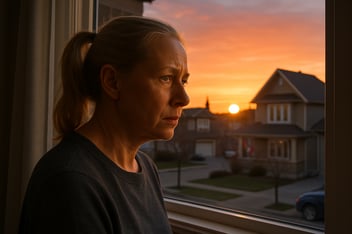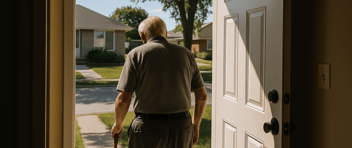MedicAlert's Safe & Found Program: A Lifeline for Dementia Wanderers

In the world of dementia, where disorientation and confusion are commonplace, MedicAlert's Safe & Found Program can be a trusted service and resource for individuals and their caregivers. The Program, designed to support those with dementia who tend to wander, has yielded remarkable results that underscore its importance in reuniting loved ones and enhancing the quality of life for those affected. Yet it is not only the impact the program has for those who wander that is important, but also the critical data it yields that helps MedicAlert to understand effective ways to expand our scope of services and interventions for individuals and families who are navigating the complexities of dementia-related wandering.
In 2023 as part of a larger research project, MedicAlert spoke to dozens of individuals and caregivers who had experienced a wandering incident in the past 12 months. These conversations yielded some interesting information.
One of the most astonishing findings from the research is that 50% of individuals who wandered due to their dementia do not remember getting lost. This revelation sheds light on the unpredictable nature of the condition and emphasizes the need for proactive measures. Forgetting that they were ever lost can be dangerous for people who live with dementia and distressing for the caregiver who is often working to help the person understand the risks associated with leaving their home environment. For MedicAlert, this means we can and must do more to support caregivers with tools that help to mitigate wandering instances.
Technology has become an indispensable tool for most people, and dementia wanderers are no exception. A striking 63% of individuals who became lost were wearing or using technology including GPS devices such as Red Dot Alert systems, Apple Watches, and air tags. While these tech-savvy solutions have proven helpful in certain situations, they are only useful if the individual is wearing them. In many instances our research has shown that there is a false sense of security for caregivers who rely on the devices only to find that their loved one has discarded it during a wandering incident or was never wearing it before leaving home.
Interestingly the statistics also reveal that dementia wanderers are seldom alone when they go astray. A significant 70% were in the company of others when they got lost. This underscores the importance of constant vigilance and preparedness among caregivers and communities. The presence of companions can facilitate a quicker response and a safer return home.
Despite the inherent risks associated with wandering, a reassuring 75% of MedicAlert subscribers were not injured when they got lost. This compares to other research that indicates that when MedicAlert is not involved, more than 50% of individuals experience some sort of harm and potentially even death. While the MedicAlert Safe & Found Program appears deceptively simple, it is our connection to the first response community as well as Good Samaritan’s knowledge of MedicAlert that helps ensure individuals are returned home unharmed at a much higher rate.
One of the most significant statistics from our research is that 100% of those surveyed reported that this was not their first time getting lost. A staggering 63% had experienced being lost more than three times in the past year. These recurrent episodes highlight the relentless and challenging nature of dementia wandering and why MedicAlert continues to advocate with both the Federal and Provincial governments that wandering must be a part of dementia strategies, particularly as we are poised to see the number of people living with dementia double in the next 6 years.
When faced with the bewildering experience of getting lost, 50% of dementia wanderers did ask for help. What is particularly heartwarming is that most of them sought assistance from strangers, often called Good Samaritans. This statistic underscores the importance of community awareness and empathy and why MedicAlert actively fundraises to support the development of programs that are designed to assist the public in understanding what to look for is they suspect they have encountered a person with dementia who has wandered away from a safe environment.
Community service agencies play an indispensable role in supporting individuals with dementia who wander. Remarkably, 100% of those surveyed receive some form of help or support from these agencies, including Personal Support Workers (PSWs) and adult day programs. This collaborative effort between MedicAlert and community services ensures a comprehensive approach to caregiving and wanderer safety.
The impact of the MedicAlert’s Safe & Found Program on both individuals and their caregivers is immeasurable. An overwhelming 88% of respondents reported that the service provides them with peace of mind. One individual even described it as a "lifesaving service." This sentiment reflects the profound sense of security and reassurance that the Safe & Found Program offers to those dealing with the challenges of dementia wandering.
Lastly, 63% of respondents reported the need to update their MedicAlert record. WE cannot emphasize this enough in the case of those who wander. This statistic underscores the importance of regularly maintaining and reviewing crucial information to ensure that the program remains effective. Keeping records accurate and up to date ensures that if a person does wander, those who are looking for them have the most current and accurate information possible to help locate them as quickly as possible.
The data stemming from follow-up interviews with individuals who have wandered due to dementia paints a vivid picture of the invaluable role played by MedicAlert's Safe & Found Program. It also represents an opportunity for the future. MedicAlert, with support from donors and funders, will be working over the next 12 to 24 months to develop additional services and products designed to support individuals and caregivers who must deal with the challenges and dangers posed by wandering. If you would like to contribute to this vital work, you can donate here or reach out to donations@medicalert.ca.



